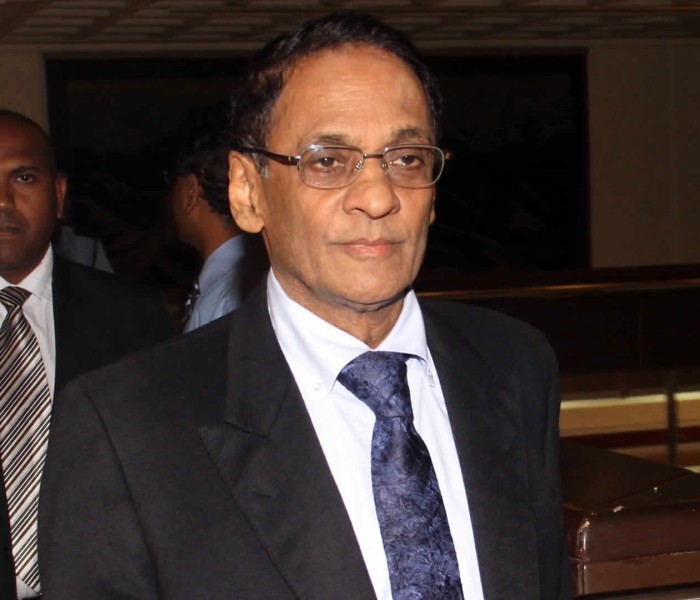Vishnu Lutchmeenaraidoo: «Une hausse salariale de 1% coûtera Rs 1,3 milliard à l’économie»
 Par
Defimedia .info, Defimedia.info
Par
Defimedia .info, Defimedia.info
 Par
Defimedia .info, Defimedia.info
Par
Defimedia .info, Defimedia.info

La Private Notice Question (PNQ) du leader de l’Opposition Paul Bérenger à l’Assemblée nationale mercredi 2 décembre a été axée sur la compensation salariale.
Paul Bérenger a demandé au ministre des Finances Vishnu Lutchmeenaraidoo si les employés des secteurs privé et public obtiendront une compensation salariale à partir du 1er janvier 2016. Il a aussi voulu savoir pourquoi que le comité tripartite pour discuter du quantum de compensation salariale ne s’est pas réuni jusqu’ici. Vishnu Lutchmeenaraidoo a confirmé dans sa réponse qu’une réunion tripartite pour discuter de la question de compensation salariale se tiendra jeudi 3 décembre. Ce sera ensuite au Conseil des ministres de décider de la marche à suivre. Le ministre des Finances n’a pas donné d’indications si une compensation salariale sera payée à partir du 1er janvier 2016, car, selon lui, il est prématuré à ce stade de le faire. Vishnu Luchmeenaraidoo a indiqué qu’il est prévu que le taux d’inflation sera de 1,3 % cette année : « Ce sera le taux le plus bas depuis 28 ans. » Et d’ajouter : «Government policies and measures aimed at improving the purchasing power of the population have contributed significantly to bringing down the inflation rate to such a low and stable level.» Vishnu Lutchmeenaraidoo a aussi indiqué qu’une hausse de 1 % des factures salariales coûtera environ Rs 1,3 million à l’économie, soit 0,3 du Gross Domestic Product (GDP). [padding-p-1 custom_class=""][/padding-p-1]
To ask the Honorable Minister of Finance and Economic Development Whether, in regard to the annual wage compensation payable to employees for loss of purchasing power due to inflation, he will state- (a) Why the tripartite meeting for discussion thereof have not been held to-date, indicating if same will be held urgently and, if so, when and if not, why not; and (b) If same will be paid to employees of both the private and public sectors as from 01 January 2016? [padding-p-1 custom_class=""][/padding-p-1] Madam Speaker, The Tripartite Committee usually meets annually a few weeks before the Budget exercise is completed. This year is exceptional because the budget covers a period of eighteen months ending June 2016. The next budget exercise is expected to be completed by May next year. In years when the fiscal year begins on 1st July, the Tripartite Committee Meeting was held in the month of May and the Additional Remuneration Bill was introduced in the National Assembly after the Appropriation Act has been passed. As regards Part (a) of the question, the Cabinet has decided that a Meeting of the Tripartite Committee be convened for determination of the payment of salary compensation on Thursday 3rd December. Madam Speaker, I wish to remind the House that the policy priority of Government this year has been to improve the purchasing power of the most vulnerable families and deal with the issue of absolute poverty. To this end we have taken several measures. First, we granted a salary compensation of Rs 600 across the board, with effect from 1st January 2015 to all employees which was well over and above the inflation rate of 3.2 percent. This has cost Rs 1.3 billion to the public sector and Rs 3 billion to the private sector for a total of Rs 4.3 billion. Second, Government has also increased, under the Marshall Plan, the Basic Retirement Pension substantially, from Rs 3,623 monthly, to Rs 5000. This has cost the Budget an extra amount of Rs 4.7 billion, bringing the annual budget for Basic Pensions from Rs 11.7 billion to Rs 16.4 billion, that is an increase of 40 percent. Third, we have lowered the price of mogas at the pump from Rs 45.95 to Rs 41.35 per litre, that is by 10 percent. Fourth, we have lowered the price of diesel, from Rs 37.80 per litre to Rs 32.75, that is by 13.4 percent. Fifth, Government is subsidising basic commodities like cooking gas, flour and rice at a cost of Rs 810 million. Sixth, Government has extended the Youth Employment Programme (YEP) to the public sector, thus employing an additional 1000 youths. Seventh, as announced last week, Government is introducing a new social electricity tariff for some 70,000 low income households that will be effective as from January next year. Concerning the inflation rate for the year 2015, it is expected at around 1.3 percent. This would be the lowest inflation rate over the past 28 years. Government policies and measures aimed at improving the purchasing power of the population have contributed significantly to bringing down the inflation rate to such a low and stable level. I must stress that if we want to join the league of advanced countries, it is imperative that increases in the wage bill is matched by increases in labour productivity. This is crucial to improving the competitiveness of our country, attracting more investment and creating more jobs. I wish to inform the House that a 1% increase in wage bill will cost the economy around 1.3billion that is 0.3% of GDP. As regards Part (b) of the question, the issue of salary compensation will be addressed by the Tripartite Committee which will make recommendations to the Cabinet. At this stage it is premature to pre-empt the decision of Cabinet on this matter.